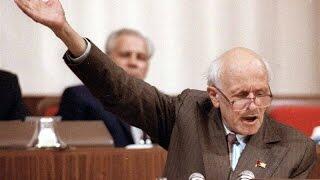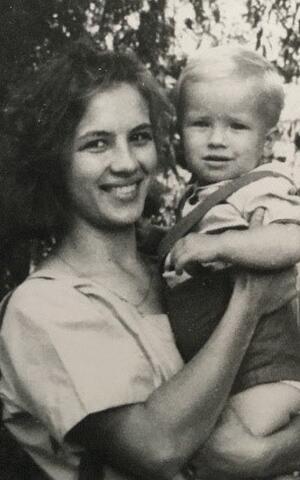
"Another nail in the Soviet Union’s coffin"
Dr. Oksana Seumenicht, Research Development Manager, Department for Strategic Cooperations and Research Funding
To be frank, I have no specific memory of that particular day, 9th of November 1989. It is strange to think you lived through so important an event and did not notice it happening. But then, those were very intense years filled with dramatic and unimaginable political events in my own country. I guess, it is only understandable that the fall of the Berlin wall in faraway Germany was just a very distant event indeed.
The author with her son in 1989.
In 1989 I was a 3rd year physics student at then Taras Shevchenko Kiev State University and lived in the Ukrainian Soviet Socialist Republic of the Soviet Union. Now it is called Taras Shevchenko National University of Kyiv, Ukraine. The change of spelling Kiev to Kyiv was introduced to reflect the historic name of the city as pronounced by people living there since over 1500 years, in one of the many attempts of my nation to reclaim its identity. I’ve just resumed my studies after 1 year ‘academic’ break due to the birth of my son, and managing both a toddler starting his Kita and my interrupted courses in electrodynamics and quantum mechanics kept me busy and rather distant from the political turmoil happening around me.
I do have a very clear memory of another day of that year, the 9th of June of 1989. I watched on TV the address of Andrei Sakharov (Nobel Peace Prize 1975) at the 1st Congress of People's Deputies of the Soviet Union demanding to repeal Article 6 of the USSR Constitution, which secured the political monopoly of the Communist Party.

He was not allowed to finish his speech. This humble wise man was laughed at by the majority of the ‘people’s’ deputies. I remember the overpowering feeling of helplessness, but little did I know that the cracks in the seemingly indestructible building of the bloody empire of the Soviet Union have already started to appear.
I remember the overpowering feeling of helplessness.
Only later I could comprehend how privileged I was to study and share the dormitory with some active participants of the first Ukrainian Majdan, known as “The revolution on granite”, which took place in October 1990. Led by the Student Union, this was probably the first massive peaceful protest, – the rally on the first day gathered 100 000 people. It also was effective and led to the resignation of one of the highest-ranking officials, the Chairman of the Council of Ministers of the Ukrainian SSR. This was unbelievable – some fellow students carrying hunger-strike on then October Revolution Square (now – Majdan Nezalezhnosti/Independence Square) won against the all-powerful Communist Party. And this happened to be just another nail in the Soviet Union’s coffin, leading to Ukraine re-gaining its independence, and me getting an opportunity to carry out my research first in Denmark, then in Germany and the UK.
For me personally, such concepts as freedom, human rights, democracy are not just words to be taken for granted.
I was born behind the “Iron Curtain”. In a village, the name of which only remains in my passport (it was recently changed due to decommunization laws). In Ukraine the country, that some still question the right to exist. For me personally, such concepts as freedom, human rights, democracy are not just words to be taken for granted. I also remember seeing Soviet tanks on the streets of Kyiv in August 1991. I do find it rather strange and difficult to understand how here, in the West, 30 years after the fall of the Berlin wall quite a few people do not seem to treasure what they have gained – the values, for which my people are still have to pay with their lives on the Eastern front.
© picture-alliance / RIA Nowosti

